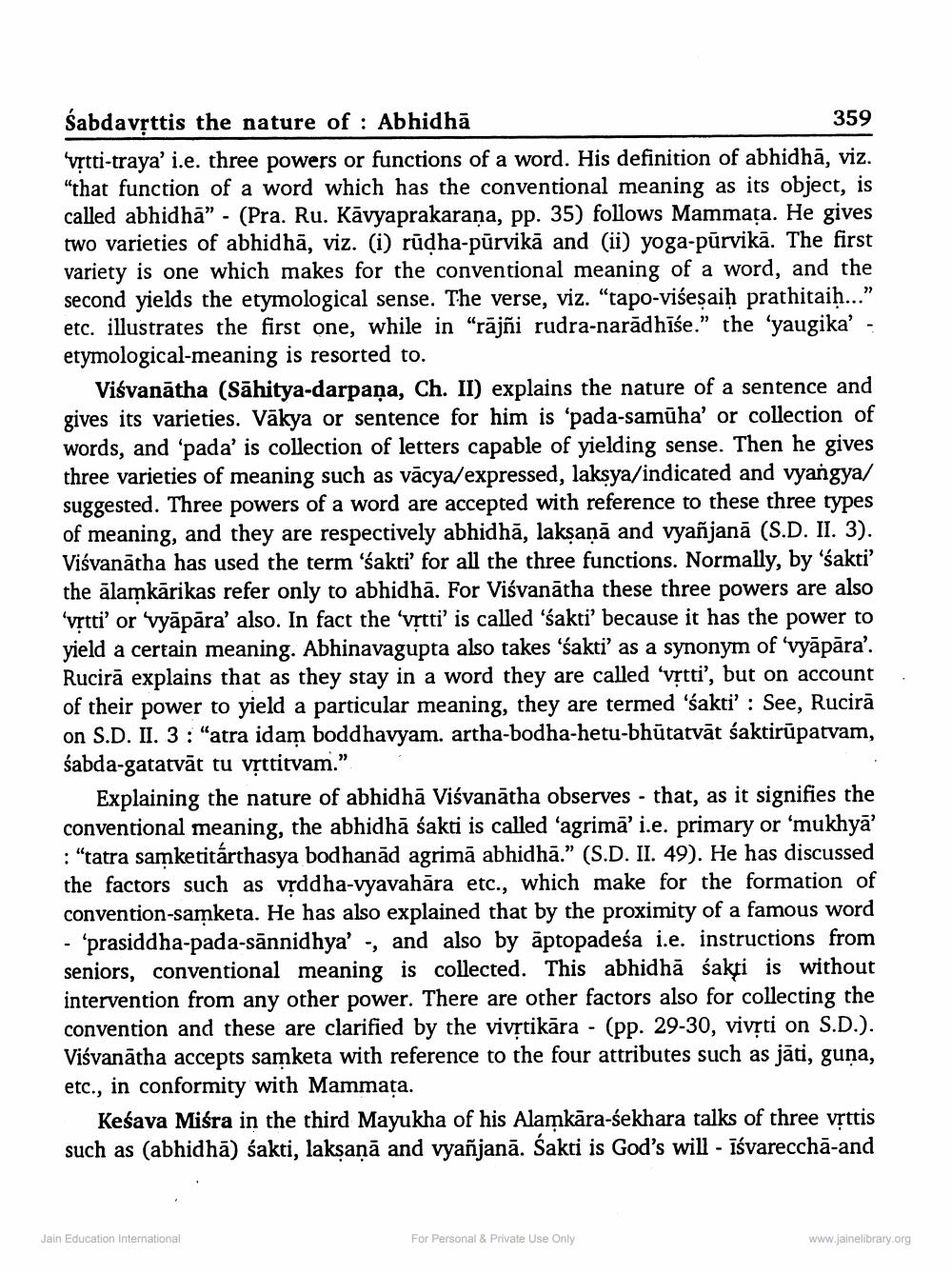________________
Śabdavșttis the nature of : Abhidhā
359 vrtti-traya' i.e. three powers or functions of a word. His definition of abhidhā, viz. "that function of a word which has the conventional meaning as its object, is called abhidhā" - (Pra. Ru. Kāvyaprakarana, pp. 35) follows Mammata. He gives two varieties of abhidhā, viz. (i) rūdha-pūrvikā and (ii) yoga-pūrvikā. The first variety is one which makes for the conventional meaning of a word, and the second yields the etymological sense. The verse, viz. “tapo-višesaih prathitaiḥ...” etc. illustrates the first one, while in “rājñi rudra-narādhiše.” the 'yaugika' - etymological-meaning is resorted to.
Viśvanātha (Sāhitya-darpaņa, Ch. II) explains the nature of a sentence and gives its varieties. Vākya or sentence for him is 'pada-samūha' or collection of words, and 'pada' is collection of letters capable of yielding sense. Then he gives three varieties of meaning such as vācya/expressed, laksya/indicated and vyangya/ suggested. Three powers of a word are accepted with reference to these three types of meaning, and they are respectively abhidhā, lakṣaņā and vyañjanā (S.D. II. 3). Visvanātha has used the term 'sakti' for all the three functions. Normally, by 'sakti' the alamkārikas refer only to abhidhā. For Viśvanātha these three powers are also 'vrtti' or vyāpāra' also. In fact the 'vrtti' is called 'sakti' because it has the power to
Id a certain meaning. Abhinavagupta also takes 'śakti' as a synonym of 'vyāpāra'. Rucirā explains that as they stay in a word they are called 'vrtti', but on account of their power to yield a particular meaning, they are termed 'sakti' : See, Rucirā on S.D. II. 3 : "atra idam boddhavyam. artha-bodha-hetu-bhūtarvāt saktirūpatvam, śabda-gatatvāt tu vịttitvam.”
Explaining the nature of abhidhā Visvanātha observes - that, as it signifies the conventional meaning, the abhidhā Śakti is called 'agrimā' i.e. primary or ‘mukhyā' : “tatra samketitárthasya bodhanād agrimā abhidhā.” (S.D. II. 49). He has discussed the factors such as vrddha-vyavahāra etc., which make for the formation of convention-samketa. He has also explained that by the proximity of a famous word - 'prasiddha-pada-sannidhya' ., and also by aptopadeśa i.e. instructions from seniors, conventional meaning is collected. This abhidhā Śakti is without intervention from any other power. There are other factors also for collecting the convention and these are clarified by the vivstikāra - (pp. 29-30, vivsti on S.D.). Viśvanātha accepts samketa with reference to the four attributes such as jāti, guna, etc., in conformity with Mammața.
Keśava Miśra in the third Mayukha of his Alamkāra-sekhara talks of three vșttis such as (abhidhā) sakti, laksanā and vyañjanā. Sakti is God's will - īśvarecchā-and
Jain Education International
For Personal & Private Use Only
www.jainelibrary.org




